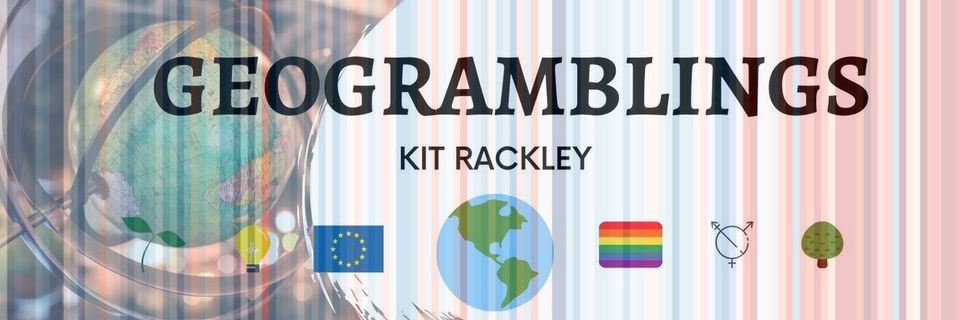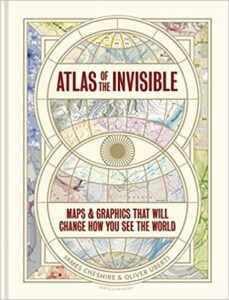
Part 2 MARK STATMAN: MEXICO AND THE POETRY OF GRIEF AND CELEBRATION
Part 2 of my interview with Mark Statman looks closely at Mark’s Latin American poetic influences, his life in Mexico and ends with an extract

I asked UEA degree-qualified Environmental Scientist Kit Marie Rackley of Geogramblings about climate change. Kit is Host of the Coffee & Geography Podcast and Consultant to the GA & NASBTT. In the course of answering my questions Kit unpacked some interesting concepts such as ‘coffee and geography’, ‘Atlas of the Invisible’ and the ‘inner geographer’.
Leslie: Looking back to childhood, how did you first become aware that we were, even then, heading towards climate and ecological breakdown? As a critical thinker, how & why did that feeling, and concerns about clikmate justice, grow and develop? What strategies/activities help you to live with that feeling/knowledge today?

Kit: There was very little discussion, when I was growing up, outside of school. When very young there was more concern amongst the grown-ups about hyper-inflation, high interest rates and the shadowy threat of nuclear war. Although I do have vague memories of my parents commenting on how little snow there was, in general, compared to when they were kids. The first time I really came across it at any depth was during Geography lessons at secondary school, with my teacher using the prevailing language at the time which was ‘this could lead to’, ‘possible future’ and it was all focused on the global scale – a problem for distant shores. Studying climate change and meteorology as an undergraduate made it real for me. But that was all data, process and academic. What really got me thinking was during my career as a Geography teacher. As an evolution from the language my teacher used, in my first few years I used phases like ‘probably’ and ‘is possible if’. A few years after that, it became ‘likely’, ‘is impacting the likes of… (other country, people)’ and finally, the language was not just unequivocal, it’s now more local. Being someone with a sensitive sense of justice, I was already tuned to how unfair it was from a social justice point of view, but admittedly, it was something that wasn’t driven home until the stories of impacts became closer to home. I felt very restricted and confined within the school curriculum. How could I thread climate change and ecological breakdown throughout without contributing to the growing problem of anxiety amongst our young people? Stepping away from the chalkface, working with climate scientists and, later, as a freelance consultant and science communicator allowed me to tackle this head on. I was able to bring in nuance and context into the teaching of the climate crisis. This helped me immensely and I feel much more empowered.
Leslie: As a Geography teacher, can you describe how the subject is taught today at secondary level and the benefits of the modern approach. How have you trained other teachers, and what have you been involved with in the Geographical Association?
Kit: The feeling I get from the geography teachers community is one of frustration. Indeed there is passion, there is drive but a lot of anxiety that the prescriptive elements of the subject we hold dear are frankly inadequate for the needs of our students. But, geography teachers are nothing but resourceful, and very collaborative. The intersectional nature of the subject means we can draw links and parallels almost anywhere and an increasing number of teachers are finding ways to weave in important issues like the climate crisis throughout the curriculum. Yes, what questions may come up in an exam and how to answer them are, unfortunately, still king-makers. But since the causes, impacts and solutions to the climate crisis are intersectional and interdisciplinary, it’s not hard to do. The recent and increasing focus on techniques to prepare students for exams, such as retrieval practise and spacing, has helped I think. Studying global development? Ok, how are the impacts of the climate crisis stunting that in places, or causing groups of people to be victims of the economic system that is driving greenhouse gases? And then later, when doing Natural Hazards, those themes come up again when recalling the destruction brought about by a tropical storm case study, say. This is one approach I have taken when training teachers – how can they thread familiar elements throughout in a way that helps retrieval of knowledge and understanding, but also provides that important sense that the climate crisis infiltrates everywhere, and is a social justice issue? A practical thing to do some curriculum mapping. Which aspects of a scheme of work may lend itself well to climate change or ecological breakdown? This isn’t just for geography teachers, it works across all subject areas and provides a vehicle for cross-curricular collaboration. The Geographical Association have used my expertise in climate science and science communication to give talks and workshops not just about climate change science, but how to be more effective in teaching it, what the key elements are to communicate and how to communicate them, and how to bring in skills such as critical thinking.
Leslie: As a UEA degree-qualified Environmental Scientist, what are the key takeaways you’d like the public to understand about meteorology and climate change?
Kit: Everyone must become ‘climate literate’. I don’t mean they need to understand the science or the data – more of the case that they need to know what it means for them. These three ideas are a good starting point
The difference between weather and climate. “Oh look, it’s snowing! So much for climate change!” The best analogy I have is that weather is the clothes you are wearing today, and climate is your entire wardrobe. Over time your wardrobe of clothes my shift if where you live gets, say, warmer and drier on average. But you’ll probably still need that raincoat from time to time. Shifting the average temperature higher means that hotter days are becoming more frequent, and cooler days less so. But the latter will still happen.
Understand the key terminology. A lot of confusion and misunderstanding comes from the use of certain terminology. Knowing the key ones mean and how they are applied is important. Terms such as ‘temperature anomaly’, ‘projection’ and even ‘average’. But if there was one term everyone must understand, and that’s ‘uncertainty’. Too many people take the everyday definition to believe that scientists aren’t sure about what’s going on, and some players can weaponise this. Uncertainty is good science. It means much research, modelling and testing has taken place to give a range of possibilities and confidence. In fact, the level of uncertainty has become so narrow in climate projections and looking into what is causing it, that officially, scientists have no doubt what’s going on and humans are to blame.
Every action and degree matters. There will be more widespread impacts at 2°C of average global warming and beyond compared to 1.5°C . For example, extreme heatwaves will be around 14x more likely with an average global rise of 2°C, compared to 9x at 1.5°C. In a world that’s warmer by 4°C deadly heatwaves are likely to be a staggering 39x more likely. So some may feel hope is lost to keep warming to the minimum, but everything we can do to avoid the worse matters, especially to the most vulnerable in society. I like to say, you may think it’s too little, but it’s never too late. Thinking this way can help turn anxiety into agency, which I’ll come back to.
Leslie: Could you expand on the main idea(s) from these topics you’ve taught, please :
Kit: During the heights of COVID I started up a podcast called ‘Coffee & Geography’, frankly as a way to just talk to people! It first started out as recorded chats with folks in the geography teacher community, but then it got so much wider in scope – including academics, hobbyists, actors, sci-fi geeks – you name it – all exploring their inner geographer. The conversations I had were quite profound at times, but also organic and genuine – like you would over a cup of tea or coffee. I wanted to share little snippets of chats and discuss them at the recent Geographical Association Conference, about what we can learn from them and how it can enrich classroom teaching. I played 9 clips, amongst those was a bit of my chat with actor Adil Hussain, where he described a profound experience where he developed a deep connection to nature while in preparation for an acting role. Another from Dr Keston Perry, speaking about his work but also personal connection to colonialism and climate change in the Caribbean. The clip I played from Métis White Raven Woman Candace about how us humans can reconnect with the land. I can tell that those present in the conference session were deeply moved by what they heard – and certainly made them introspective towards their teaching practise going forward.

Kit Along with two other geography educators, I was delighted to be invited by Professor James Cheshire at UCL to come up with some educational material for ‘Atlas of the Invisible’, a book he co-authored with artist Oliver Uberti. The book takes graphical and geographical themes and maps them in a way that gets the reader thinking and questioning what they are seeing. It is not just about different and unusual map projections, it is also about the data that is plotted and the stories that those plots can tell, and they are perfect for getting students to practice analysing different kinds of data presentation. Not to mention give more context and background to what is being looked at. A workshop with teachers encourages discussion on the purpose of maps, where does the power lie, what do visualisations like those in Atlas of the Invisible offer that ‘normal’ classroom atlases don’t? How could we improve or adapt the educational material? I enjoyed the entire process from start to finish for the decolonial nature of it.
Kit: I have been asked by many organisations, academy chains and teacher networks to give ‘alternative’ talks on climate change – the most popular request usually involves ideas for taking climate anxiety in students, and how to deal with the sense of hopelessness that comes with learning about the fact that we are in a global ecological crisis. My initial inspiration for becoming deeply passionate about this topic is thanks to the wonderful Clover Hogan, a young person who has championed the youth voice when it comes to feelings of eco-anxiety, but most importantly how to turn this ‘anxiety into agency’. Coupled with learning that climate change is largely a product of our current economic system and colonialism, the ‘agency’ must come in the form of empowerment of the otherwise powerless. The poorest, communities of colour, indigenous peoples etc, but also, in education, our youngsters. So this talk does a few things, but essentially helps teachers to recognise and understand climate anxiety, how to use reflection and policy to treat climate change as a school safeguarding issue, and steps to help students manage it and take control through considered and capable actions.
Kit: This one is a product of being on a personal journey over the past few years. Recognising and then coming-out as transgender, and immersing myself in reading and online networking regarding decolonising the geography curriculum. I have found that I have had many privilege checks over this time – and not once found it threatening, but liberating. Recognising your privilege, and by extension, bias and worldviews and how that can have an impact if very important if you want to be an effective educator with regards to allowing students to thrive byway of being who they truly are. When I deliver this training I start by highlighting the privileges I do, and don’t have – then asking participants to reflect on theirs. I then get geographical and we use primary data (through a survey) and secondary data to look at the disparities between urban and rural living. This helps to frame privilege through geography and helps to come to terms with it, not feel threatened by it and lead to discussions about how it can be used positively to improve our communities.
Leslie: What’s your view on how current world governments + finance/industry are approaching the climate/eco emergency? In a nutshell, what do you think children and adult citizens should do about it now?
Kit: Governments are failing in their civic duty to protect and safeguard the citizens they are responsible for. They are doing this knowingly, given that almost every government has signed off on the IPCC reports. Also, it is not an ideological or political thing to say that our current power structures and global economic system are key drivers of the causes of ecological breakdown. I do believe, however, that we are on the cusp of a sea-change. The circular economy, citizen assemblies and seeing value in protecting the environment are all becoming seen as not just profitable, but necessary for society to continue and also improve. We can all be part of the change. Those of us with financial privilege can invest our money into ethical and environmental schemes, pensions and banks. Work for change from the local-scale upwards, creating demand for systems and products which don’t just protect the environment but enhances it too.
Geogramblings is powered by Good Energy, who source 100% renewable electricity from 1,600 independent UK generators and supply carbon-neutral gas. Switch today and get £50
Next week, i interview poet & musician Kerry Priest about her innovative poetry collection The Bone Staircase and her experimental work at Guildhall School of Music & Drama.
ABOUT LESLIE TATE’S BOOKS:

Part 2 of my interview with Mark Statman looks closely at Mark’s Latin American poetic influences, his life in Mexico and ends with an extract

I interviewed international poet and translator Mark Statman about Volverse/Volver, his 14th published collection. Mark, who has won national arts awards, is Emeritus Professor of Literary

I interviewed Lisa Dart, finalist in the Grolier, Aesthetica and Troubadour Poetry Prizes and author of The Linguistics of Light (poems, Salt, 2008), Fathom (prose

I interviewed writer Julia Lee Barclay-Morton about her experience of autism. Julia began as an experimental dramatist in New York, moving to the UK to

I interviewed Gillean McDougall from Glasgow, who edited the collaborative projects Honest Error (on Charles Rennie Mackintosh and his wife Margaret Macdonald) and Writing the
| Cookie | Duration | Description |
|---|---|---|
| cookielawinfo-checkbox-analytics | 11 months | This cookie is set by GDPR Cookie Consent plugin. The cookie is used to store the user consent for the cookies in the category "Analytics". |
| cookielawinfo-checkbox-functional | 11 months | The cookie is set by GDPR cookie consent to record the user consent for the cookies in the category "Functional". |
| cookielawinfo-checkbox-necessary | 11 months | This cookie is set by GDPR Cookie Consent plugin. The cookies is used to store the user consent for the cookies in the category "Necessary". |
| cookielawinfo-checkbox-others | 11 months | This cookie is set by GDPR Cookie Consent plugin. The cookie is used to store the user consent for the cookies in the category "Other. |
| cookielawinfo-checkbox-performance | 11 months | This cookie is set by GDPR Cookie Consent plugin. The cookie is used to store the user consent for the cookies in the category "Performance". |
| viewed_cookie_policy | 11 months | The cookie is set by the GDPR Cookie Consent plugin and is used to store whether or not user has consented to the use of cookies. It does not store any personal data. |
2 responses
Hi Leslie, this is a very interesting discussion. The biggest issue with addressing climate change is the impact on economies and people’s lifestyles. Look how people generally reacted to the lockdowns when they were not able to travel freely. It was a great time for our environment but people feel entitled to travel in cars, planes and on cruise ships. Even now, the cost of fuels have risen hugely this year, the impact on peoples lives is equally big. People are having to cut back but they don’t like it. The headlines are full of stories about the cost of living crisis. If people really want to do something about climate change, they have to be prepared to make the necessary sacrifices until a better solution is found (if there is one – electric cars don’t really help as they have to be charged for example). Governments deal in votes and votes boil down to happy voters. Thanks for the thought provoking article.
Thanks, Robbie. I think people will do the necessary if they come to believe it’s what most other people are doing. So in the UK the popular media is run by people who don’t read the science and give out the message that we can’t do much. Once the climate crisis hits closer to home they’ll change their tune and people will be persauded very quickly of what they knew all along – we have to live more simpl;y for our children/grandchildren’s sake. Change, when it comes, is exponential! Thank you, Leslie xxx